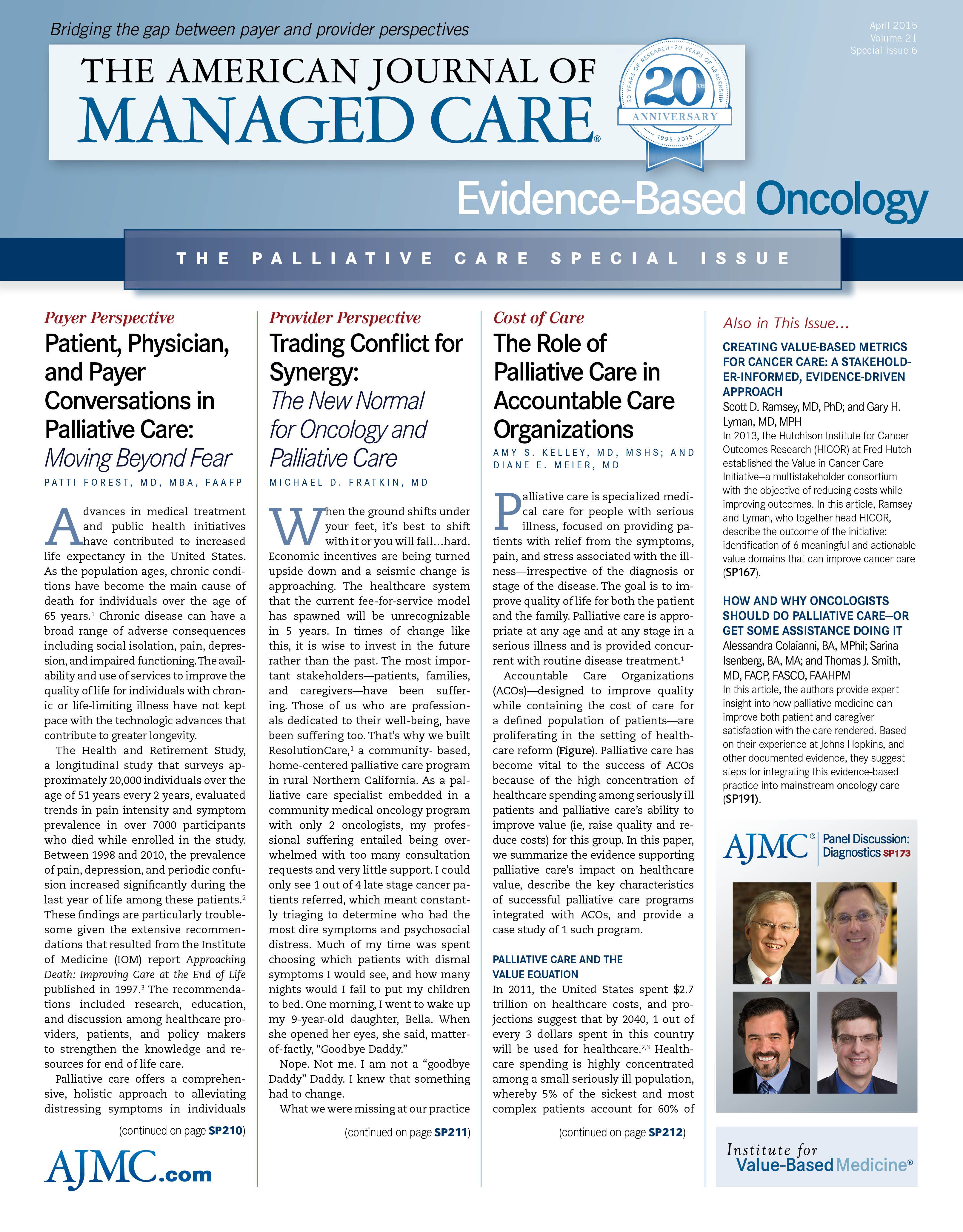- Center on Health Equity & Access
- Clinical
- Health Care Cost
- Health Care Delivery
- Insurance
- Policy
- Technology
- Value-Based Care
Palliative Care Integrates Value in Cancer Care
Over the past 4 decades, cancers survival rates have improved signi cantly. The American Association of Cancer Research estimates that 1 of 22 people living in the United States is a cancer survivor, bringing the total to nearly 14.5 million current survivors. As an oncologist specializing in the care of patients with blood cancers, I have seen patients affected by many previously untreatable diseases live longer, healthier, better-quality lives thanks to a rapidly evolving armamentarium of innovative and targeted therapies.
Much of the national conversation regarding cancer care now focuses upon how best to deploy these new agents, how to ensure adequate access to best- practice—based medicine, how to be a good steward to the increasingly expensive portfolio of anticancer medications, and how to ensure the functional and economic sustainability of our healthcare system.
In this inexorable push toward more innovative cancer care, it is easy to forget that not all patients can be cured. As physicians, there is a certain internal reassurance in being able to offer our patients more—1 more chemotherapeutic regimen, another novel therapeutic agent, and another attempt at radiation therapy. In our zeal to offer something more, we may sometimes forget how best to honor the priorities and needs of our patients. In those conversations that are most dif cult to have, rede ning the goals of care for someone who cannot be cured may form the basis for the most powerful therapy possible.
The idea of actively assisting patients throughout this process falls outside of our traditional disease-based treatment models. Palliative care physicians provide oversight and expertise to insure the proper care and management of distress, pain, emotional suffering, coping, end of life, grief, and recovery. The discipline incorporates psychosocial and spiritual care according to patient and family needs, values, beliefs, and culture. The goal of palliative care is to anticipate, prevent, and reduce suffering in order to ensure the best possible quality of life for patients and their families.
Palliative care is most effective when it is engaged early in the care of patients— it can help provide extraordinary value to patients affected by cancer by shifting the care model from being disease-and-organ—focused to being patient-and-family–centered. Too often, palliative care physicians are called in when it is too late to adequately address issues of suffering, end-of-life care, and end-of-life decision making.
In this issue of Evidence-Based Oncology, we explore in depth the topic of palliative care. The authors review not only how to make such care more accessible, but how to better understand the extraordinary value that is delivered by making palliative care an integral part of our cancer care delivery models. As cancer care is increasingly metricized, we need to ensure that we develop metrics adequate to afford appropriate value to palliative care.
EBO
Twenty years ago, my father was diagnosed with incurable colon cancer. His physician introduced our family to palliative care. In so doing, he ensured the best possible care for my father and our entire family. I have come to believe that the best measure of the effectiveness of our ght against cancer is not the number of genes that we have sequenced, or studies that we have performed, or new medicines that have been created; it is our ability to restore hope to someone who is suffering from the fear of a new cancer diagnosis, it is our ability to help a family affected by cancer a nd a sense of wholeness, and it is our ability to center our care on the most pressing needs of our patients and their families.

Specialty and Operator Status Influence Electronic Health Record Use Variation
January 22nd 2026Operators demonstrated specialty-specific differences in electronic health record efficiency, timeliness, and after-hours use, highlighting how workflow and training shape documentation behaviors across medical disciplines.
Read More
Exploring Racial, Ethnic Disparities in Cancer Care Prior Authorization Decisions
October 24th 2024On this episode of Managed Care Cast, we're talking with the author of a study published in the October 2024 issue of The American Journal of Managed Care® that explored prior authorization decisions in cancer care by race and ethnicity for commercially insured patients.
Listen

